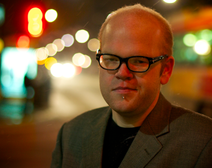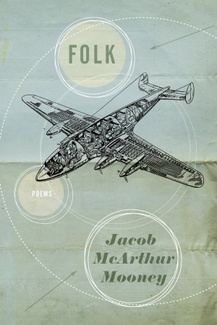 Jacob McArthur Mooney Jacob McArthur MooneyPhoto by Mike McPhaden Jacob McArthur Mooney is the author of The New Layman's Almanac (McClelland & Stewart, 2008) and Folk (M&S, 2011), the latter of which was a finalist for the Dylan Thomas Prize and named to best-of-2011 lists by The Globe and Mail, The National Post, and his mother. RUSTY TALK WITH JACOB MCARTHUR MOONEY Kathryn Mockler: What is your first memory of writing creatively? Jacob McArthur Mooney: I feel like there's a level at which this is a question about lying. Telling fibs is a proto form of creative writing. And I've been doing that for some time. But if you mean, Writing Things that were Untrue with the Intention of Sharing Them as Untruths, then maybe that's later. I don't remember writing much as a kid. College maybe? College, with a handful of moments and phases beforehand. But mostly college. KM: What keeps you going as a poet or why do you write? JMM: I always hear "what keeps you going" as a very wishy-washy, very weak-of-soul question. Not that you're wishy or washy to ask it. I feel your asking is a test, and I'd be wishy and washy if I failed the test by answering it ironically. What do we mean: What keeps me going? Is poetry arduous? Is it a chore? Really? I suspect that people who think poetry is hard have lives that are too easy. It’s a fun, freeing, extrapolation on your life. Consider it thusly and you won’t let yourself think about “keeping going” anymore. It's a challenge to do it well, but the challenge is always enjoyable. Almost always, anyway. The challenge is enjoyable during the majority of its lifespan. What keeps me going? Liking it. I like doing it, and so I do it more. Positive feedback loop. The cycle continues. Hamster; jogging. Response, reward. That being said, maybe if I thought it had stopped being fun, I’d stop. Maybe, one day, that’ll happen. I can’t predict the future, but for now: I’m kept going by momentum and the lack of objects in my path. Like a spy satellite. KM: Could you describe your writing process? (For example, do you write every day? When? Where? How do you approach revision, etc.) JMM: Not every day. Most days, maybe. I've definitely had stretches where I write every day for several months, but also stretches where I go pretty barren for a long time. Dennis Lee once told me he's the owner of multiple 6-month long "No New Poetry" stretches. Having heard that, I've started to embrace my own. If I don't seem to be writing new stuff, I edit. And really, I edit, juggle, rework and pester a lot more than I write new stuff. Anything less than an 80:1 ratio of Time Spent Tinkering: Time Spent writing that First Draft, and you're likely not a very good poet. Or at least, not the kind of poet you could be. I like to stay as mobile as possible, and as unencumbered by superstition. I keep notes everywhere. Usually there's a notebook in my pocket when I leave the house. I use my work computer, my phone, my home computer, whatever. Bits of paper and receipts. And this is really for the 1, not for the 80, in that previously-mentioned ratio. The 80 is more private. I can sometimes stomach being in a cafe or something, but for the most part my reworking process happens at home. KM: Rejection or criticism can often stop poets before they start. Do you have any advice on how to deal with rejection? JMM: It's going to happen. Everyone gets rejected. It doesn't mean you suck. Sometimes, it means they suck. KM: How would you describe writer/editor relationship? What can novice writers expect? JMM: First off, the novice writer should consider themselves lucky that they get to work with an editor in the first place. The true "editor", for poetry especially, is going extinct. Most journals staff out editorial work to undergrads and they are only there to accept/reject, not edit in any true sense of the word. They aren't going to make your work better than it was when you submitted it. It's not as bad when you're talking books, most Poetry Editors at presses will help you along to some degree. I've been really lucky in my poetry life to have good editors. Stan Dragland and Molly Peacock and Anita Chong at M&S. And, more casually than that, all my friends and mentors along the way that have gotten their hands into my manuscripts. An ideal relationship between a writer and an editor consists of equal parts friction and ease. They should, broadly speaking, see the work like you see it, be able to slip into your vocabulary and your rhythms. But they're also there to be a separate set of eyes, so they should be distinct enough to question what you're doing, within that general context of "getting it". Genetically speaking, an ideal editor is your cousin, but not your identical twin. KM: What poets are you reading now? JMM: I have a cycle with JH Prynne where I have to re-read his collected work every year or so, and am doing so now. Participating in the Irving Layton gig at Harbourfront last week has renewed my interest in Layton, also. I was away for the second half of 2011, first as the Pierre Berton Resident in Dawson City YT and then as a sort of travelling hobo with a European Rail pass, so I missed a lot of good books. I liked the new Stefanie Bolster and Mark Callanan titles quite a bit. I read with Don McKay in Halifax last month and managed to pocket his new one, too. Everything that dude does is perfect. It's like he's challenging himself now with progressively less interesting source material: from birds to, now, rocks, and he's still coming up with invigorating, completely exciting, work. I'm on a non-fiction kick now, too. I've been digesting works of economic history, some surveys but other more specific titles in areas like the development of international finance, and Mergers & Acquisitions. This is in part for my day-job, but I'd do it for kicks, anyway. The vocabulary is so rich; big tasty Latinate everywhere. Maybe I end up using this stuff in my poetry, maybe not. Either way....you stick it in your cheeks and save it for a cold day, because you never know. KM: Your funniest literary moment, if you have one. JMM: Oh man. What if I didn't have any? What would that say about me? My time at the Guelph MFA program is rich with lost nights full of long, barely-remembered, and completely inexcusable stories. But what's college for if not the indexing of a catalogue of inexcusable stories? KM: What are you working on now? JMM: I continue to try and roll a novel uphill, only to have it coast back down the other side on me. I've been working away at it for several years now. I don't know if it's closer to finished than it was in 2010. Novels are hard. If I had put this time into trying to become a professional baseball shortstop instead of a novelist, I wonder if I'd be any further along. I'm writing some new poems. I think that the three-year gap between books 1 and 2 will be eclipsed, easily, by the gap between books 2 and 3. I'll write what comes, I guess. And tinker with the rest.  JACOB MCARTHUR MOONEY'S MOST RECENT COLLECTION Folk, McClelland & Stewart, 2011 Description from McClelland & Stewart The two sections in Jacob McArthur Mooney’s virtuoso collection – one rural in orientation, one urban – open an intricate conversation. Taking as its inciting incident the 1998 crash of Swissair Flight 111 off the coast of Nova Scotia, before moving to the neighbourhoods around Toronto’s Pearson International Airport, Folkis an elaborately composed inquiry into the human need for frames, edges, borders, and a passionate probe of contemporary challenges to identity, whether of individual, neighbourhood, city, or nation. Mooney examines the fraught desire to align where we live with who we are, and asks how we can be at home on the compromised earth. This is poetry that poses crucial questions and refuses easy answers, as it builds a shimmering verbal structure that ventures “beyond ownership or thought.” Mooney’s distinctive voice is seriously unsettling, deeply appealing, and answerable to our difficult times. Comments are closed.
|
Rusty Talk
Rusty Talk Editor: Archives
November 2017
Categories
All
|

 RSS Feed
RSS Feed
